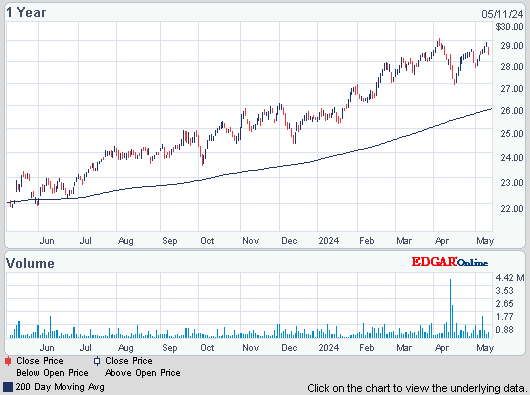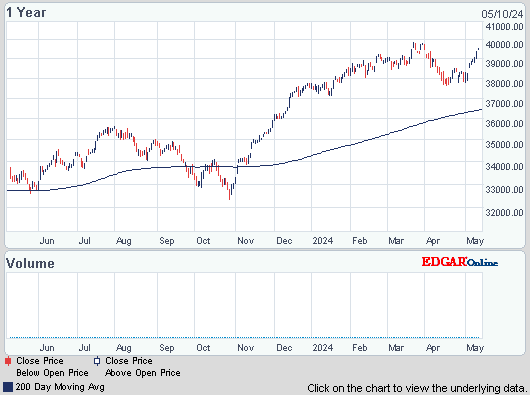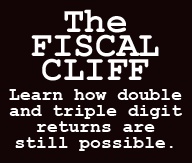Dow fell 21, advancers slightly ahead of decliners & NAZ dropped 11. The Financial Index lost 1 to 227, still near its yearly high reached yesterday. The MLP index rose another 3 to 403 (an eye popping 24 in 3 days) after yesterday's enormous gain & the REIT index slipped a fraction to 271. Junk bond funds were mixed & Treasuries sank again, bringing their yields to 7 month highs. Risk averse thoughts have been discarded. Oil was steady but gold pulled back.

![Live 24 hours gold chart [Kitco Inc.]](http://www.kitco.com/images/live/gold.gif)


Photo: Bloomberg
The Federal Reserve (FED) expressed broad support last month for the FED's plan to buy bonds to support the US economy. But they differed over how long to keep buying bonds to drive down long-term interest rates. Minutes of the meeting show that some of the members thought the bond purchases would be warranted through the end of this year. Others felt the purchases should be slowed or stopped altogether before the end of 2013. This group was concerned that too much bond buying by the FED might destabilize the economy. The FED ended up approving open-ended purchases of $85B a month in Treasury securities & mortgage backed bonds. After the meeting, the FED said it planned to keep a key interest rate at a record low even after unemployment falls close to a normal level, which it said might take 3 more years. As long as the outlook for inflation is mild, the FED said it could keep short-term rates near zero at least until unemployment drops below 6.5%. The statement was approved 11-1.
Most FOMC Participants Saw QE3 Ending in 2013

Photo: Yahoo
Bill Gross, founder & co-CEO of PIMCO, wrote in his first letter to investors this year that money printing by central banks will lead to a destructive bout of inflation. Gross, who has criticized purchases of Treasuries & agency mortgage bonds in past letters, wrote in his Jan investment outlook entitled "Money for Nothin' Writing Checks For Free" that the purchases will lead to a devaluation of currencies & gradually weaker investment returns. "The future price tag of printing six trillion dollars' worth of checks comes in the form of inflation and devaluation of currencies either relative to each other, or to commodities in less limitless supply such as oil or gold," Gross wrote. He referred to a speech in 2002 by Ben Bernanke in which Bernanke said that the US could print an unlimited number of dollars "at essentially no cost." Gross countered in his letter that the cost will be inflation, which will weaken the returns on long-term bonds & eventually risk assets such as stocks & high-yield bonds, & also hurt businesses. Gross likened inflation to "dragons" lurking within the "cave" of money-printing programs. "Zero-bound interest rates, QE maneuvering, and ‘essentially costless' check writing destroy business models and stunt investment decisions which offer increasingly lower ROIs and ROEs," Gross wrote (referring to returns on investment and equity).
PIMCO's Gross Warns Investors of Looming Inflation Reuters
US auto sales hit a 5-year high in 2012, as low interest rates, improving consumer confidence some great new cars drew Americans into dealers. Sales of new cars & trucks are expected to reach 14.5M for 2012, up 13% from 2012. That's not quite a return to the boom times of 2005, when sales hit 17M, but sales are 40% higher than they were at the depths of the recession in 2009. Volkswagen saw a 35% jump in sales in 2012, one of the biggest increases in the industry & Chrysler's sales jumped 21%. Both General Motors (GM) & Ford (F) lost the market share they gained in 2011 when the earthquake hurt their Japanese competitors. GM saw a lackluster 4% increase, hurt by weak truck & Cadillac sales. Ford's sales were up 5% after new versions of some of its biggest sellers, Escape SUV & Fusion sedan, had to be recalled for safety problems. Japanese automakers struggled with low inventories for much of 2011 after the earthquake hurt supplies. But sales picked up in the first few months of 2012 & never looked back. Toyota (TM) US sales were up 28% & Honda's rose 24%. Even though the fiscal cliff deal raised tax rates on wealthy individuals, carmakers don't see a big impact on sales
Why car sales are strong in the US AP
Stocks took the day off after yesterday's breathtaking gains. The economic fundamentals behind the advance didn't justify that kind of surge. MLPs did even better, although much of that enthusiasm came from relief that new tax rules did not disturb their tax advantaged status. Dow is at its highest levels in over 4 years (aside from Oct 2012). Tomorrow will begin with the jobs report & expectations are for a modest number. Higher Social Security taxes on everybody who works can lead to more months with unsatisfactory jobs reports.

AMJ (Alerian MLP Index tracking fund)
| CLG13.NYM | ...Crude Oil Feb 13 | ...92.91 | ....0.21 | (0.2%) |
![Live 24 hours gold chart [Kitco Inc.]](http://www.kitco.com/images/live/gold.gif)


Photo: Bloomberg
The Federal Reserve (FED) expressed broad support last month for the FED's plan to buy bonds to support the US economy. But they differed over how long to keep buying bonds to drive down long-term interest rates. Minutes of the meeting show that some of the members thought the bond purchases would be warranted through the end of this year. Others felt the purchases should be slowed or stopped altogether before the end of 2013. This group was concerned that too much bond buying by the FED might destabilize the economy. The FED ended up approving open-ended purchases of $85B a month in Treasury securities & mortgage backed bonds. After the meeting, the FED said it planned to keep a key interest rate at a record low even after unemployment falls close to a normal level, which it said might take 3 more years. As long as the outlook for inflation is mild, the FED said it could keep short-term rates near zero at least until unemployment drops below 6.5%. The statement was approved 11-1.
Most FOMC Participants Saw QE3 Ending in 2013

Photo: Yahoo
Bill Gross, founder & co-CEO of PIMCO, wrote in his first letter to investors this year that money printing by central banks will lead to a destructive bout of inflation. Gross, who has criticized purchases of Treasuries & agency mortgage bonds in past letters, wrote in his Jan investment outlook entitled "Money for Nothin' Writing Checks For Free" that the purchases will lead to a devaluation of currencies & gradually weaker investment returns. "The future price tag of printing six trillion dollars' worth of checks comes in the form of inflation and devaluation of currencies either relative to each other, or to commodities in less limitless supply such as oil or gold," Gross wrote. He referred to a speech in 2002 by Ben Bernanke in which Bernanke said that the US could print an unlimited number of dollars "at essentially no cost." Gross countered in his letter that the cost will be inflation, which will weaken the returns on long-term bonds & eventually risk assets such as stocks & high-yield bonds, & also hurt businesses. Gross likened inflation to "dragons" lurking within the "cave" of money-printing programs. "Zero-bound interest rates, QE maneuvering, and ‘essentially costless' check writing destroy business models and stunt investment decisions which offer increasingly lower ROIs and ROEs," Gross wrote (referring to returns on investment and equity).
PIMCO's Gross Warns Investors of Looming Inflation Reuters
US auto sales hit a 5-year high in 2012, as low interest rates, improving consumer confidence some great new cars drew Americans into dealers. Sales of new cars & trucks are expected to reach 14.5M for 2012, up 13% from 2012. That's not quite a return to the boom times of 2005, when sales hit 17M, but sales are 40% higher than they were at the depths of the recession in 2009. Volkswagen saw a 35% jump in sales in 2012, one of the biggest increases in the industry & Chrysler's sales jumped 21%. Both General Motors (GM) & Ford (F) lost the market share they gained in 2011 when the earthquake hurt their Japanese competitors. GM saw a lackluster 4% increase, hurt by weak truck & Cadillac sales. Ford's sales were up 5% after new versions of some of its biggest sellers, Escape SUV & Fusion sedan, had to be recalled for safety problems. Japanese automakers struggled with low inventories for much of 2011 after the earthquake hurt supplies. But sales picked up in the first few months of 2012 & never looked back. Toyota (TM) US sales were up 28% & Honda's rose 24%. Even though the fiscal cliff deal raised tax rates on wealthy individuals, carmakers don't see a big impact on sales
Why car sales are strong in the US AP
Stocks took the day off after yesterday's breathtaking gains. The economic fundamentals behind the advance didn't justify that kind of surge. MLPs did even better, although much of that enthusiasm came from relief that new tax rules did not disturb their tax advantaged status. Dow is at its highest levels in over 4 years (aside from Oct 2012). Tomorrow will begin with the jobs report & expectations are for a modest number. Higher Social Security taxes on everybody who works can lead to more months with unsatisfactory jobs reports.










No comments:
Post a Comment